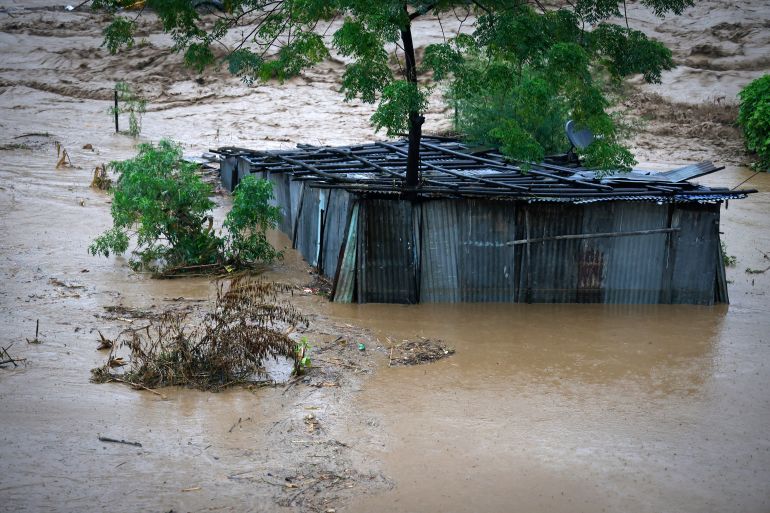Nepal closes schools as heavy rains bring country to standstill
Some 150 people killed and dozens missing after bad weather triggers floods and landslides.
A tin shed lies partially submerged at the edge of the Bagmati River in spate after heavy rains in Kathmandu, Nepal, September 28, 2024 [Gopen Rai/AP]Published On 29 Sep 202429 Sep 2024
Officials in Nepal said schools in flood-hit areas will be shut in the coming days as landslides and flash flooding triggered by heavy rains have killed some 150 people.
The order on Sunday came as authorities said students and their parents faced difficulties while university and school buildings damaged by the rains needed repair.
“We have urged the concerned authorities to close schools in the affected areas for three days,” Lakshmi Bhattarai, a spokesperson for the Ministry of Education, Science and Technology, told the Reuters news agency.
Entire neighbourhoods in the country’s capital, Kathmandu, were inundated over the weekend with flash floods reported in rivers coursing through the region. The floods also damaged the highways connecting the city with the remainder of Nepal.
Some parts of Kathmandu reported rain of up to 322.2mm (12.7 inches), pushing the level of its main Bagmati River up 2.2 metres (7 feet) past the danger mark, experts said.
Television images showed police rescuers in knee-high rubber boots using picks and shovels to clear away mud and retrieve 16 bodies of passengers from two buses swept away by a huge landslide, at a site on the key route into Kathmandu.
Kumar Tamang, who lives in a slum area by a riverbank, told the AFP news agency he and his family had to flee after midnight on Saturday as waters rushed into his shack, but on Sunday morning, the situation was different.
“We couldn’t even open the doors to our house, it was jammed with mud,” he said.
“Yesterday we were afraid that the water would kill us, but today we have no water to clean,” the 40-year-old added.
Local weather forecaster Govinda Jha said rains had subsided on Sunday.
“There may be some isolated showers, but heavy rains are unlikely,” Jha added.
Domestic flights also resumed in and out of Kathmandu by Sunday morning after having completely stopped on Friday evening, with more than 150 departures cancelled since then.
In this aerial image of the Kathmandu Valley, Bagmati River is seen flooded due to heavy rains in Kathmandu, Nepal [File: Gopen Rai/AP]
The summer monsoon brings South Asia 70-80 percent of its annual rainfall.
While deadly rain-related floods and landslides are common across the region during this period, weather officials in Nepal have blamed these rainstorms on climate change and a low-pressure system in the Bay of Bengal extending over parts of neighbouring India.
Haphazard development amplifies climate change risks in Nepal, climate scientists at the International Centre for Integrated Mountain Development said.
In a statement, they urged the government and city planners to “urgently” step up investment in, and plans for, infrastructure, such as underground stormwater and sewage systems, both of the “grey” or engineered kind, and “green” or nature-based type.
The effect of the rains was aggravated by poor drainage due to unplanned settlement and urbanisation efforts, construction on floodplains, lack of areas for water retention, and encroachment on the Bagmati River, the statement said.
